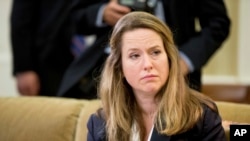The International Organization for Migration announced in a statement Monday that Pope would become the organization's first woman chief on October 1.
"Humbled and honored to be chosen as the next Director General of (IOM)," Pope said in a tweet, minutes after member states elected her by acclamation after current IOM chief, Portugal's former deputy prime minister Antonio Vitorino, bowed to her lead and withdrew.
After an unusually acrimonious leadership battle that pitted the United States against its European allies, the IOM's 175 member were asked Monday to vote by secret ballot on who should steer the organization for the next five years.
After a first round of voting, Pope was clearly in the lead, missing just 12 votes to reach the two-thirds majority needed to declare victory.
Instead of allowing the vote to go to a second round, Vitorino decided to bow out of the race.
"I am ready to work with ALL our member states and global partners to unleash the opportunities provided by effective, orderly and humane migration," Pope said in her tweet.
The IOM was founded in 1951 to handle the displacements in Europe following World War II but the agency only joined the U.N. fold seven years ago.
The Geneva-based body is the leading international agency addressing the needs of some 281 million migrants throughout the world, according to a 2020 estimate.
Within the U.N. system, agency chiefs who wish to take on a second term are typically shooed in without challenge.
When Pope announced her candidacy in October, "it was a bit of a shock", a European diplomat in Geneva acknowledged to AFP on condition of anonymity.
"It was not seen as a friendly move."
Vitorino had appeared defiant before the vote.
"All my predecessors for 70 years made two mandates, and I don't see any reason for a successful first mandate not to be followed by a second mandate," he told AFP in March.
Vitorino enjoyed particularly strong support from European countries and had been praised for effectively leading the rapidly expanding organization.
But Pope, 49, appears to have managed to convince countries in other regions where she has relentlessly campaigned, insisting a fresh vision was needed to take IOM "into the 21st century."
"We're still kind of stuck in old ways of looking at migration," Pope told AFP in March.
She has called for a broader focus on the impacts of climate change on migration, which she dubbed "one of the most significant challenges for our generation."
"With evolving threats posed by climate & conflict, together we can assist vulnerable communities on the move seeking protection & deliver on the promise of migration," she tweeted Monday.








